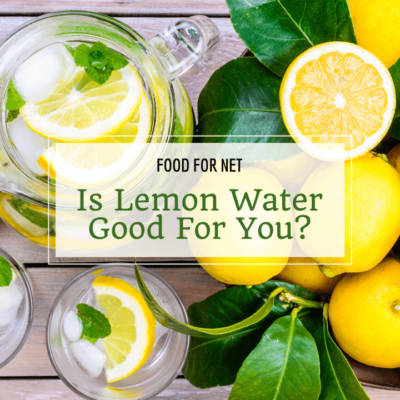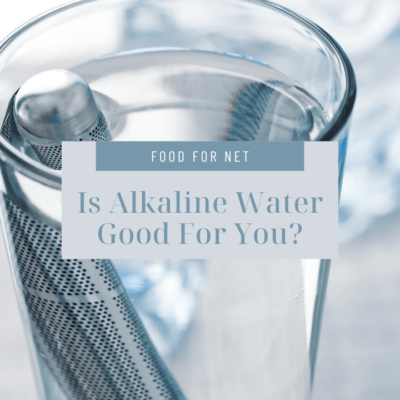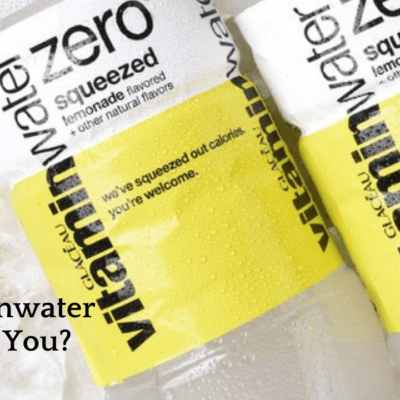
When it comes to water, there’s this persistent idea that more is better. After all, water is essential for our survival. It helps with weight loss, digestion, blood pressure levels, and much more.
Modern lives also tend to be hectic, so it’s easy to simply not get around to drinking as much water as we need to. One way to get enough water is to set a daily target. You might even use a marked water bottle or an app that helps to monitor your daily water intake.
Some people even try to drink a whole gallon of water per day. That’s a lot of water, yet there’s enough hype around the idea to suggest it might be worth trying. Still, is drinking a gallon of water a day good for you?
After all, a gallon of water seems pretty extreme. It’s also far above most advice for water consumption. The idea could be simply social media hype or perhaps it’s actually legitimate advice that should be followed.
Is Drinking A Gallon Of Water A Day Good For You?
- The Benefits Of Water
- How Much Water Do You Need?
- Should You Drink A Gallon Of Water A Day?
- How Do You Know When You Need Water?
- Ways To Increase Your Water Intake
- Final Thoughts
The Benefits Of Water

Let’s begin with the basics, why you should be drinking water. The first part of that topic is obvious – water is essential for life. Our bodies don’t function well, or at all, without it.
Getting enough water each day keeps our bodies at a suitable temperature, helps to lubricate joints, helps with waste removal, carries nutrients throughout our bodies, and has many more effects as well.
Plus, when you’re getting enough water, your physical performance tends to improve, your energy is increased, you think more clearly, and weight loss becomes a little easier. Pretty exciting, right?
If you’re in the United States or another developed country, water mightn’t seem like a big deal. Safe drinking water is easy to find. We’re very blessed in that way.
Yet, many of us aren’t getting the water we need. It’s easy to simply forget about drinking water and focus on other things. We might have a glass or two throughout the day, plus water in some other drinks, but not enough to meet all our needs.
That pattern can lead to mild dehydration, which can mean that you have less energy, experience headaches more often, and may be dizzy.
Getting enough water sometimes involves setting a daily target and making sure you hit it regularly. Being intentional like this helps lower your risk of dehydration and protects your health.
How Much Water Do You Need?
So then, water is important, but how much should you be having?
This is a surprisingly tricky question to answer. We’re often told that we should drink around eight 8-ounce cups of water every day. That gives you around 64 ounces of water or roughly half a gallon.
However, that figure is just used because it is nice and easy, not because it’s accurate. Seriously. It’s even tricky to work out where the idea comes from and there’s little scientific evidence behind it.
Another recommendation is that men should be getting around 125 ounces of water per day, while women should get 91 ounces. That recommendation gets closer to the idea of drinking a gallon of water a day – but it isn’t suggesting that you drink that much water.
Remember, some of your water comes from other sources too, including water rich foods. Most beverages contain some water too, even the very unhealthy ones.
Hydration needs also vary depending on your weight, how much you exercise, any health problems, whether you are vomiting/have diarrhea/etc., whether you’re pregnant, and your age.
Some experts also suggest that our water consumption isn’t even the most critical factor. The balance of water to electrolytes matters more, which means that drinking too much water can be a problem as well.
In the end, the most relevant indication of your water needs is thirst. It’s that simple. Your thirst is tuned to your individual needs in a way that no health recommendation can be.
Should You Drink A Gallon Of Water A Day?

The gallon of water a day idea is far above most health recommendations. It seems to come from the basic idea that more water is better, which isn’t really true.
Very few people will actually need to drink a gallon of water per day to stay healthy.
I mean, let’s be honest, a gallon of water is a lot. Seriously. It’s 128 ounces of water. It’s also double the normal recommendation of eight 8-ounce glasses (and plenty of us struggle with the eight glass recommendation).
If you’re highly active and sweat a lot, a gallon of water might be a reasonable target. The same is true if you’re in a very hot environment. However, in those cases, you’d need to be getting some electrolytes too, rather than just plain water.
Is A Gallon Of Water Dangerous?
You can overdo it with water, creating a problem called water intoxication. This is where the electrolytes in your blood become imbalanced, as you’re consuming large amounts of water and not many electrolytes.
The problem isn’t common, but it does happen. It’s most often associated with athletes who drink a large amount of water to rehydrate, rather than using electrolyte-rich drinks.
If you have a healthy diet and lifestyle, drinking a gallon of water a day isn’t likely to cause water intoxication. Still, it’s important to keep an eye on your electrolyte intake.
Also avoid having too much water too quickly. For example, half a gallon of water in a few hours isn’t a wise approach. Instead, try to space your water consumption throughout the day.
Why Is The Idea Popular?
Having a gallon of water per day has been trending. You can even buy gallon bottles online that are designed to help you keep track and stay motivated.
Many people swear that the water has helped them to lose weight, feel more energized, have better skin, and more. How does this happen if most people don’t need that much water?
One reason is that we don’t tend to make health changes in isolation. So, someone who decides to drink a gallon of water per day might also start to eat more fresh fruit and vegetables, work out more often, and avoid sugary snacks.
Those changes all influence health and energy, much more than the gallon of water would. Plus, if someone went from drinking very little to drinking a gallon of water each day, they’d see many hydration benefits. It would be easy to miss the fact that they are now overdoing it with water.
There’s also a displacement effect. If you’re drinking a lot of water, you’re probably having fewer sugary drinks and snacks. That’s helpful.
Finally, if you expect a gallon of water per day to improve your health, you might attribute any improvements to the water – whether they’re related or not.
These patterns, combined with inspirational social media posts, help to keep the gallon a day idea cycling around – regardless of what’s actually true.
How Do You Know When You Need Water?

Looking for some magic amount of water to drink every day isn’t the most effective approach. It’s much better to pay attention to your body instead. This way you can adjust your water intake based on your needs, which will sometimes change from one day to the next.
The following approaches can all help you work out when you need to drink more water. However, it’s best to treat them all as rough indicators of hydration status, as they can be inaccurate in some situations (which is the reason for considering multiple areas).
Use Your Pee As A Guide
The color of your pee is a common way to work out hydration.
Most of the time your pee should be a light yellow color. It doesn’t need to be perfectly clear, but dark yellow pee is a sure sign you need more water.
There’s a catch here, though. Some medications and foods can change the color of your pee. Multivitamins are a common culprit here, as high doses of vitamin B2 create a neon yellow color in your pee.
If this is happening for you, you may find that your urine color doesn’t change much, regardless of how much water you drink. You’ll need to use other cues for hydration instead.
Pay Attention To Your Thirst
Your thirst is another important area. Some theories suggest that this doesn’t work and that you’re already mildly dehydrated when you start to feel thirsty. Honestly, though, your body is good at telling you what it needs. There’s nothing wrong with trusting your sense of thirst.
Thirst is the single best hydration guide. Well, it is in most situations. The thirst response tends to get less reliable as people age or with some health conditions
Look For Dehydration Symptoms
You can also look for symptoms of mild dehydration, including having a dry mouth, headaches, muscle cramps, and fatigue.
There’s also a skin test, where you pinch some of your skin with two fingers and then watch how quickly it returns to normal once you let go. Normally, the skin should spring back quickly, within a second or two. If it takes longer than this, you may be dehydrated.
Think About Your Water Intake And Loss
If you’re not sure whether you might be dehydrated, have a think back over the day. How much liquid have you taken in? Have you lost a decent amount through sweating, diarrhea, or in some other way?
If your fluid intake has been low or your fluid loss has been dramatic, you might need to increase your fluid intake.
Talk To Your Doctor
It’s also worth talking to your doctor about your water intake, particularly if you have a health condition or are on medication. They’ll be able to tell you the best water intake for your needs.
Ways To Increase Your Water Intake

Trying to drink a gallon of plain water is admirable. It’s also a frustrating endeavor that can be difficult to stick with.
Given that most of us don’t need a gallon of water per day anyway, why not look for more enjoyable ways to drink water instead?
The first is to vary where you get your water from. Even water rich vegetables, coffee, and tea all help you hit your daily hydration targets (don’t stress about the caffeine in your coffee, while this is mildly dehydrating, you still gain more liquid than you lose).
Looking for flavor helps too. For example, infusing your water with fresh fruit and vegetables, or adding a splash of lemon juice makes it much more interesting than plain water.
Sparkling water is an option too. The bubbles make your water a little more enjoyable, especially if you splash a little flavor in there as well.
Final Thoughts
It’s easy to think that more water is always useful, but there’s an upper limit to the benefits we get from water. Trying to finish a gallon of water every day probably isn’t helping you much, especially if you’re struggling to finish it and need to rush to the bathroom regularly.
Most people can afford to ease back a bit (or a lot!) and pay attention to their body instead. In fact, simply drinking water when you’re thirsty is often more than enough to keep you healthy and hydrated.
You might even find that you need less than eight glasses of water a day. That’s okay. Some people are built this way. If you still want to try for a gallon of water a day, be sure to stagger your water intake so that you’re not drinking too much at once. You might also need to increase your electrolyte intake, especially if you sweat a lot.
Frequently Asked Questions
Does Drinking Water Help You Lose Weight?
Drinking water can help with weight loss in a few ways. First, having water instead of sugary drinks like soda is an easy way to decrease your sugar intake, which is always good for weight loss. Water can also suppress your appetite a little and perhaps even improve your appetite.
There’s also a decent link between dehydration and weight gain. So, drinking enough water to avoid dehydration is crucial for weight loss.
Still… water isn’t a magic potion for weight loss. If you’re already getting adequate water, drinking more isn’t likely to help. And, drinking excessive amounts of water to offset food intake isn’t wise at all. You still need to be getting plenty of food and sufficient calories to stay healthy.
How Many Bottles Of Water In A Gallon?
This all depends on how large your water bottles are. But, as a reference point, the standard water bottle in the United States contains around 16.9 ounces of water. There are 128 ounces in a gallon, which means we’re looking at roughly 7.5 bottles of water per gallon.
Is A Gallon Of Water Too Much?
For most people, drinking a gallon of water a day isn’t likely to cause harm. The biggest issue is simply that you’ll probably be visiting the bathroom often. But this level of water consumption isn’t likely to be all that helpful either. You could probably drink half as much water and still hit all your hydration needs.
Can You Gain Weight From Drinking Water?
Water doesn’t contain any calories, so it’s not going to make you gain weight in the traditional sense. That said, your weight might temporarily increase simply due to the weight of the water within your body. Your body might also retain water at times, but this still isn’t the same as gaining fat.
How Much Water Should You Drink A Day?
We’re often told that we should drink 8 glasses of water a day, which calculates to roughly half a gallon. But, that’s just common advice, rather than scientifically proven fact. You can still use the 8-glass recommendation as a good starting point, just be sure to adjust up or down based on what your body needs.
Adjusting like this is important, as many factors can impact your water needs, including exercise and metabolism. You might also be consuming plenty of water rich foods and mugs of tea, which provide some water and decrease the amount of straight water you need to drink.









 Are Pretzels Good For You?
Are Pretzels Good For You?
Leave a Reply